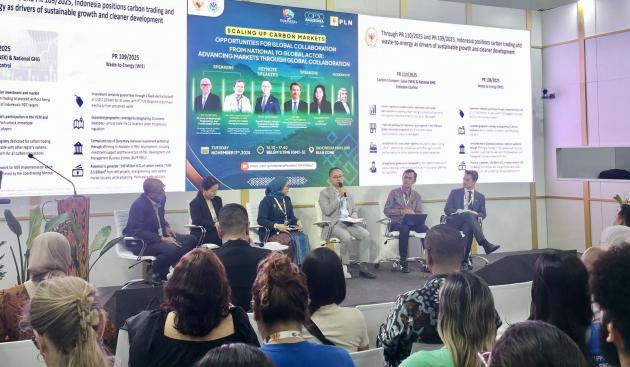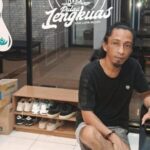PT PLN (Persero) is playing a role in developing Indonesia’s carbon market, which is connected to international standards, through a panel discussion titled “Scaling-Up Carbon Markets Opportunities for Global Collaboration” at COP30 in Belém, Brazil.
In this forum, PLN outlined the steps being taken to strengthen the integrity and transparency of national carbon trading, while also opening up opportunities for connectivity with global mechanisms.
Regulatory consistency and cross-stakeholder collaboration are important foundations for the growth of a low-carbon economy in Indonesia.
COP30 is seen as a space for Indonesia to demonstrate its readiness to lead a credible carbon ecosystem.
“Indonesia must present a clear signal that we are ready to build a transparent, measurable carbon ecosystem capable of creating real economic value. For this reason, cross-sectoral policy synchronization is no longer an option but a necessity so that our carbon market truly becomes a hub for regional collaboration.”
Indonesia has prepared policies aligned with international trading mechanisms.
Collaboration with partner countries, global certification institutions, and the development of a carbon exchange platform are part of these efforts.
“Indonesia has actually started developing international carbon market policies by introducing bilateral agreements with several partner countries, one of which is Norway.”
Strengthening carbon market integrity is also directed at improving cross-sectoral understanding, infrastructure readiness, and governance capacity.
Technology and transparency are considered key to maintaining Indonesia’s credibility in the global market.
From the energy provider’s perspective, Indonesia has great potential to build a strong carbon ecosystem.
In the Electricity Supply Business Plan 2025–2034, PLN targets the addition of 52.9 gigawatts of renewable energy, consisting of baseload, variable energy, and energy storage systems.
“The potential expansion of PLN’s renewable energy could generate up to 250 million tons of green attributes. This is not just about regulatory compliance but a real opportunity to create green economic value and accelerate the national energy transition. PLN is ready to act as a catalyst in ensuring the carbon market operates credibly.”
Furthermore, every issuance of carbon credits will follow high-integrity carbon principles to be accepted in the global market.
Collaboration with the Norwegian Government is one of the efforts to strengthen the scheme, governance, and harmonization of international standards with national policies.
COP30
“COP30” refers to the 30th Conference of the Parties (COP) to the United Nations Framework Convention on Climate Change (UNFCCC). It is a major international climate summit scheduled to be hosted by Brazil in the city of Belém, located in the Amazon region, in 2025. This location is highly symbolic, as it will place a global focus on the critical role of the Amazon rainforest in the world’s climate system and the urgent need for its protection.
Belém
Belém is a historic district in Lisbon, Portugal, renowned as the birthplace of many Portuguese Age of Discoveries voyages. It is home to iconic monuments like the Belém Tower and the Jerónimos Monastery, both 16th-century UNESCO World Heritage Sites built in the Manueline style. The area is also famous for its pastry shop, Pastéis de Belém, which originated the beloved pastel de nata custard tart.
Brazil
Brazil is the largest country in South America, with a history shaped by indigenous cultures, Portuguese colonization starting in 1500, and the legacy of the African diaspora through the transatlantic slave trade. Its vibrant culture is a famous fusion of these influences, expressed globally through its annual Carnival celebration, samba music, and its passion for football. The country is also renowned for its immense natural wonders, including the Amazon rainforest and Iguazu Falls.
Indonesia
Indonesia is the world’s largest archipelago nation, located in Southeast Asia, with a history deeply shaped by Hindu-Buddhist empires like Srivijaya and Majapahit, followed by centuries of Dutch colonial rule. It is a culturally diverse country with hundreds of ethnic groups and languages, unified by the national motto “Bhinneka Tunggal Ika” (Unity in Diversity). The nation is renowned for its significant cultural sites, such as the Borobudur and Prambanan Temple Compounds, which are remnants of its powerful ancient kingdoms.
Norway
Norway is a Scandinavian country known for its dramatic fjords, Viking heritage, and stunning natural landscapes. Its history is deeply rooted in the Viking Age, when Norse seafarers explored and traded across Europe, later forming a unified kingdom in the 9th century. In the modern era, Norway is a constitutional monarchy celebrated for its high quality of life and commitment to sustainability.
Electricity Supply Business Plan 2025–2034
The “Electricity Supply Business Plan 2025–2034” is not a physical place or cultural site, but a strategic document. It is a forward-looking plan, typically created by a utility or government body, that outlines the strategy for ensuring a reliable, affordable, and often more sustainable supply of electricity over that ten-year period. Its “history” is rooted in the ongoing global transition in energy systems, aiming to address future challenges like integrating renewable energy sources and modernizing aging infrastructure.
PT PLN (Persero)
PT PLN (Persero) is the Indonesian government-owned corporation responsible for the country’s electricity supply. It was founded in 1945 and was later consolidated into a single state-owned entity in the 1960s. As a vital national utility, it manages the generation, transmission, and distribution of power across the Indonesian archipelago.






